Biometrics DataLITE Wireless Systems
The DataLITE wireless system consists of either a USB wireless Pioneer dongle connected to a PC or the DataLITE Explore which can either be used as a wireless recording device or can act as a wireless receiving device when connected to a PC's USB port.
DataLITE provides a selection of three interfaces. Each is capable of recording up to 24 analog and 12 digital channels of data. If more is required, two or more interfaces can operate in the same environment.
The sensors convert input signals such as joint angle, EMG or force data to their equivalents and then transmit these in real-time to the PC or recorded on Explore. This produces a versatile and expandable design with the greatest possible accuracy, negligible drift and the greatest freedom for the test subject.
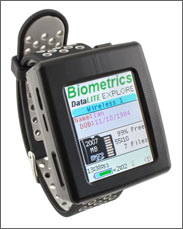
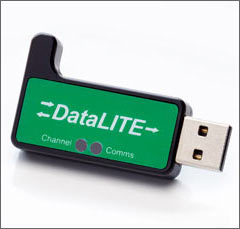

The DataLITE wireless communications uses a frequency-hoping scheme to minimise the effects of interference and multi-path signal cancellation. A total of 16 frequencies are used; these are evenly spaced from 2.38 GHz to 2.492 GHz. The dongle and sensor avoid interferences from other signals by hoping to a new frequency after transmitting or receiving a data packet. An RF channel optimization test determines the best WIFI frequency to use within the test area. The RF channel test is an easy way to detect errors on all 32 frequencies available to DataLITE and determines the best 'RF channel' to use.
DataLITE Benefits
- A versatile & expandable design:
- Up to 16 sensors may be used with a single DG2 for a maximum of 24 analogue inputs and 8 digital inputs
- 4 systems may operate simultaneously in the same environment
- A technologically advanced miniaturised wireless solution providing robust & reliable data collection
- A sophisticated communication protocol utilising a frequency-hoping scheme to minimise the effects of interference and multi path signal cancellation
- A progressive transponder data transfer scheme allows for real time data recovery
- A carefully selected digital design producing an optimum performance from a miniature battery cell
- Simple to set up and operate
- Typically 11 hours of continuous use between charging
- A typical work environment will give a 40m working range
- Precision CNC machined plastic & metal components used throughout product range giving an outstanding level of mechanical integrity
- 2 year manufacturer's warranty for whole DataLITE product range
DataLITE EXPLORE
DataLITE EXPLORE is a wearable device that provides multi-channel recordings of EMG, dynamic joint movement, acceleration and other physiological parameters from a range of wireless sensors. This provides data capture & analysis both within and outside the boundaries of normal testing environments.
- Portable Wireless Data Recorder: View real-time graphical traces and engineering units on the LCD as data is saved directly onto a removable Micro SD card for later download and analysis.
- Real-Time Data Acquisition: When tethered to a computer, EXPLORE acts as a wireless interface for real-time data display and acquisition to the PC.
- Data Transfer: When transferring real-time data via a DLL to a 3rd party interface, data is simultaneously backed up to the SD card for analysis in Biometrics software.

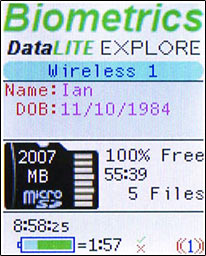
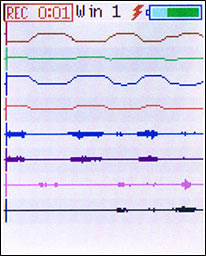
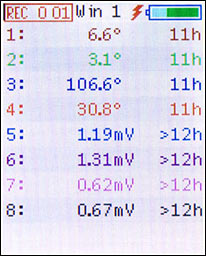
DataLITE EXPLORE Specifications
Dimensions: 16 x 52 x 45 mm
(Height x Width of wrist x Length of wrist)
Mass: 59 g
Enclosure: CNC precision machined from scratch resistant high grade aerospace polymer
Real-Time Data Acquisition: Yes
Number of Channels: 16 sensors for up to 24 channels
Save to Micro SD Card: Yes
Latency - Sensors to PC Recording: 40 mS
Wireless Transmission Loss: Tolerant for 120 mS
Power Source: Lithium polymer battery
Battery Life: Minimum 10 hours
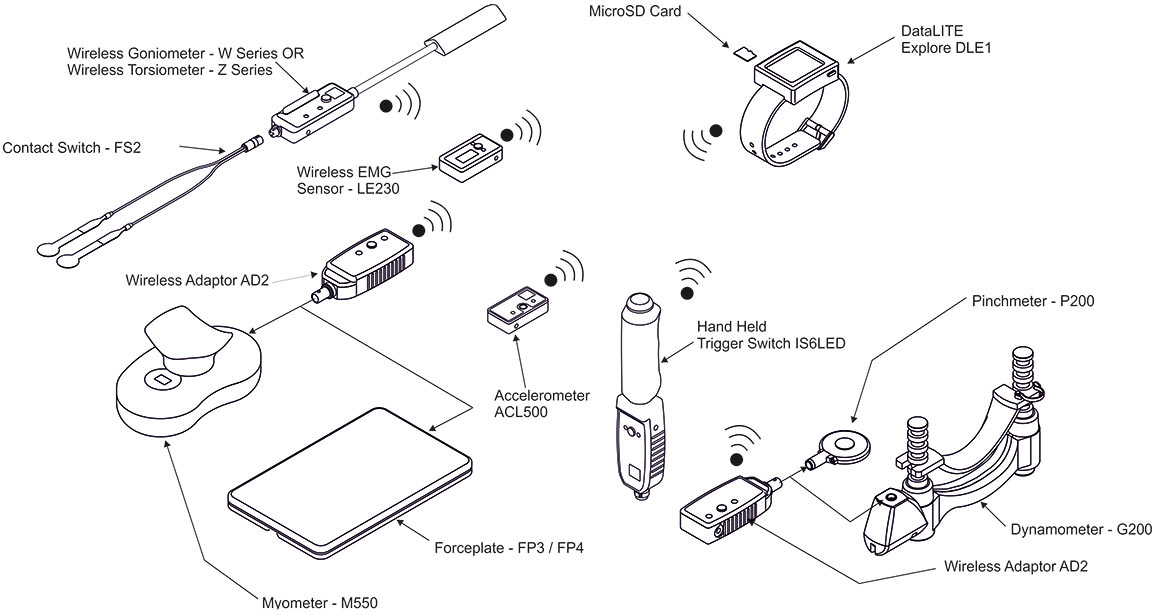
DataLITE Pioneer Dongle (DG2) Specifications
- USB connection to a Windows 8/10 desktop or laptop, or a Windows 10 tablet
- USB powered
- Minimum working range of 40m
- Up to 16 DataLITE wireless sensors on a single channel
- Up to 8 available channels allowing for multiple independent systems to be used simultaneously in the same work area
DataLITE Wireless Sensors
DataLITE Wireless Goniometers

Using the exact technology as the Biometrics electrogoniometers for dynamic joint movement measurement - the new Biometrics wireless twin axis goniometers incorporate a wireless transmitter to send data directly to the computer for display, analysis, and saving or transferring to custom applications in real-time.
Specifications
In general, there are no fixed rules governing which size of sensor is most suitable for a particular joint; this depends on the size of the subject. The sensor must be capable of reaching across the joint so that the two end blocks can be mounted where least movement occurs between the skin and underlying skeletal structure. In certain circumstances more than one size of sensor will be appropriate. The following table is given for guidance only and refers to an adult population. Size used will vary within pediatrics.

| Joint | Output | # of Channels | A Max | A Min | B | C | D | E | F | Weight (g) | |
| W65 | Wrist (pediatric) | Flexion/extension, radial/ulnar deviation | 2 | 65 | 30 | 55 | 18 | 53 | 22 | 12 | 24 |
| W75 | Wrist (adult) | Flexion/extension, radial/ulnar deviation | 2 | 75 | 35 | 60 | 18 | 53 | 22 | 12 | 25 |
| W110 | Neck, elbow or ankle | Flexion/extension, or dorsiflexion/plantarflexion and inversion/eversion | 2 | 110 | 70 | 60 | 18 | 53 | 22 | 12 | 25 |
| W110A | Ankle | Dorsiflexion/plantarflexion, inversion/eversion | 2 | 110 | 70 | 60 | 18 | 21.5 | 56 | 5.7 | 20 |
| W150 | Knee or hip | Flexion/extension and valgus/varus, or flexion/extension and abduction/adduction | 2 | 150 | 100 | 70 | 18 | 53 | 22 | 12 | 27 |
| W150/B | Back | Flexion/extension, lateral flexion | 2 | 150 | 50 | 120 | 18 | 53 | 22 | 12 | 29 |
| F35W | Finger or toe | Flexion/extension | 1 | 35 | 30 | 18 | 8 | 53 | 22 | 12 | 25 |
| Z110 | Neck | Axial rotation | 1 | 110 | 70 | 60 | 18 | 53 | 22 | 12 | 25 |
| Z180 | Back or forearm | Axial rotation | 1 | 180 | 130 | 70 | 18 | 53 | 22 | 12 | 25 |
Transducer type: strain gauge
Life1: 600,000 cycles
Accuracy: ±2° measured over a range of ±90°
Repeatability: 1° measured over a range of 90°
Operating temperature range: +10°C to +40°C
Temperature zero drift: 0.15 degrees angle/°C
1Life test results have been collected by cycling the sensors through movements that would happen during everyday use. For example, placing a sensor on an adult elbow and moving from the neutral position to maximum flexion and back to the neutral position, the unit will function for typically 600,000 cycles.
Up to 2 axis per sensor with up to 2 digital inputs suitable for pressure sensors- Resolution of better than +0.1 degree in a range of +180 degrees
- Selectable sampling rates of 1000, 500, 250 or 100 samples per second on both X and Y
- Bandwidth from DC to 500Hz, +0dB/-3dB (reduced by sampling rates lower than 1000)
- Selectable sampling rates of 1000, 500, 200, 100 or 50 samples per second on the digital inputs
- Wireless transmission data loss tolerant for 100mS
- Operates from a rechargeable Li-lon Polymer Battery with integrated charging control
- Fully charged battery life in excess of 12 hours
DataLITE Wireless Torsiometers
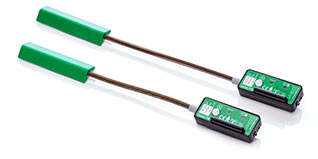
Biometrics Z series single axis Torsiometers are designed for measurement of rotations in one plane, e.g. forearm pronation/supination or neck axial rotation. If the Torsiometer is bent in planes X-X or Y-Y the output remains constant. All Torsiometers function in the same way, the difference being physical size. Z Series Torsiometer models are Z110 and Z180.
Specifications
In general, there are no fixed rules governing which size of sensor is most suitable for a particular joint; this depends on the size of the subject. The sensor must be capable of reaching across the joint so that the two end blocks can be mounted where least movement occurs between the skin and underlying skeletal structure. In certain circumstances more than one size of sensor will be appropriate. The following table is given for guidance only and refers to an adult population. Size used will vary within pediatrics.

| Joint | Output | # of Channels | A Max | A Min | B | C | D | E | Weight (g) | |
| Z110 | Neck | Axial rotation | 1 | 110 | 70 | 60 | 18 | 54 | 20 | 22 |
| Z180 | Forearm | Pronation/supination | 1 | 180 | 110 | 70 | 18 | 54 | 20 | 22 |
Transducer type: strain gauge
Life1: 600,000 cycles
Accuracy: ±2° measured over a range of ±90°
Repeatability: 1° measured over a range of 90°
Operating temperature range: +10°C to +40°C
Temperature zero drift: 0.15 degrees angle/°C
1Life test results have been collected by cycling the sensors through movements that would happen during everyday use. For example, placing a sensor on an adult elbow and moving from the neutral position to maximum flexion and back to the neutral position, the unit will function for typically 600,000 cycles.
- 1 axis per sensor with up to 2 digital inputs suitable for pressure sensors
- Resolution of better than +0.1 degree in a range of +180 degrees
- Selectable sampling rates of 1000, 500, 250 or 100 samples per second on Z
- Bandwidth from DC to 500Hz, +0dB/-3dB (reduced by sampling rates lower than 1000)
- Selectable sampling rates of 1000, 500, 200, 100 or 50 samples per second on the digital inputs
- Wireless transmission data loss tolerant for 100mS
- Operates from a rechargeable Li-lon Polymer Battery with integrated charging control
- Fully charged battery life in excess of 12 hours
DataLITE Wireless EMG
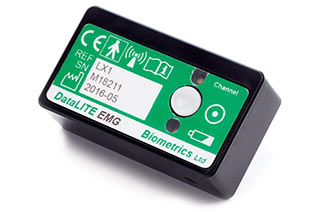
The DataLITE Wireless EMG sensor gives superb quality of signal and ease of use. With a bandwidth of 5-495 Hz and a built in 1000 gain amplifier and wireless transmitter, surface EMG signals are collected and sent to the Biometrics software for analysis. EMG data can be synchronized real-time with other sensors as part of a complete DataLITE system.
Specifications
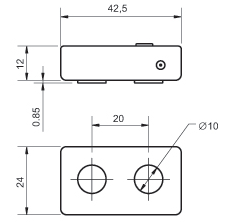
Electrodes: Integral dry reusable
Gain: Standard unit 1000
Bandwidth: 5Hz - 495Hz
Noise: < 5µV
Input Impedance: > 10,000,000 M Ohms
CMRR @ 60Hz (dB): > 96dB (typically 110dB)
Mass: 17g
For applications where variable inter-electrode distance is desired, the DataLITE Wireless EMG Amplifier (LE230FW) has two flying wire leads for use with any reusable or disposable SEMG electrode incorporating a 4mm snap. The maximum inter-electrode distance is 170mm and the minimum distance is dependent upon the size of the electrodes used.
The sensor has two powerful additional features, allowing the researcher greater flexibility in adjusting the hardware to meet specific applications.
- The user has full control over the bandwidth of the sensor from 10Hz to 250Hz through to 10Hz to 5000Hz.
- Increase the sensitivity of the Amplifier with a choice of five settings giving peak to peak measurements ranging from ± 60 microvolts to ± 6 millivolts.
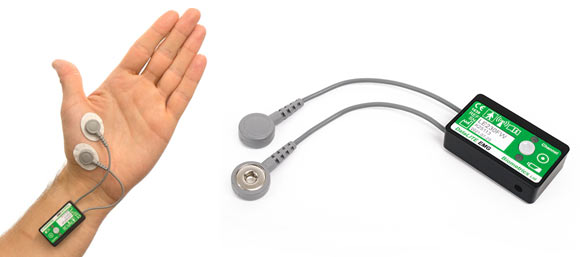
Biometrics Surface EMG Sensors, instrumentation, and software are designed with maximum versatility in mind:
- Electrostatic Discharge Circuit protected
- Up to 24 channels of EMG data display, collection, and analysis
- User selectable sampling frequency set per channel of 500Hz, 1000Hz or 2000kHz
- Easily combine EMG data with other sensors such as goniometers and forceplates
- Collect data real-time to the computer
- Comprehensive Analysis software with real-time display and analysis
- Readily synchronize EMG data with other systems/software
DLL dynamic link library streams data real time as it is collected to third party software, for example LabView or video motion analysis system software - Differential sensor with the highest input impedance in the industry minimizes noise to signal ratio providing superb signal detection
- Integral electrodes with fixed inter-electrode distance give consistent high quality results
- Operates from a rechargeable Li-lon Polymer Battery with integrated charging control
- Fully charged battery life in excess of 8 hours
- Wireless transmission data loss tolerant for 120mS
DataLITE Wireless Adaptor
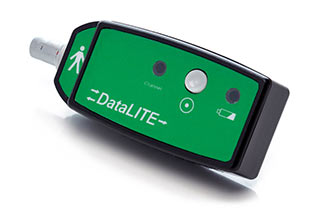
The DataLITE Wireless Adaptor is required to connect into the following devices:
- Dynamometer for measurement of hand grip strength
- Pinchmeter for measurement of hand pinch strength
- MyoMeter for quantification of force during manual muscle testing
- ForcePlates for weight distribution and balance measurements
- In-Line & S-Beam load cells
Specifications
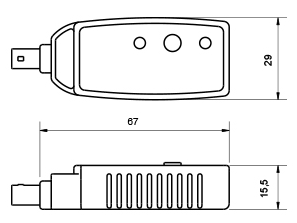
Weight: 25g
Enclosure Material: Acetal CoPolymer
Battery: Lithium Polymer rechargeable
- Selectable sampling rates of 2000, 1000, 500 or 200 samples per second
- Bandwidth from DC to 1kHz, +0dB/-3dB (reduced by sampling rates lower than 2000)
- Wireless transmission data loss tolerant for 120mS
- Operates from a rechargeable Li-lon Polymer Battery with integrated charging control
- Fully charged battery life in excess of:
- 12 hours for the Dynamometer (G200)
- 15 hours for the Pinchmeter (P200)
- 9 hours for the ForcePlate (FP3/FP4)
- 9 hours for the MyoMeter (M550)
DataLITE Wireless Contact Switches
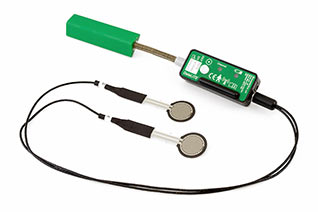
Digital inputs for gait analysis or other projects requiring collection on contact on/off data. The FS2 Contact Switches simply plug into a DataLITE Wireless goniometer. For example, mounting the goniometer on the ankle, and attaching the contact switches on the foot, it allows the researcher coordinate the gait parameters (heel strike, full foot, heel off, toe off) with the dynamic movement of the ankle joint and perhaps EMG data.
DataLITE Wireless Accelerometer
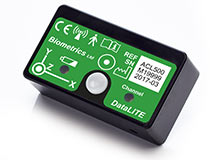
The ACL 500 is a precision 3-axis wireless accelerometer to measure both dynamic acceleration (i.e. vibration) and static acceleration (i.e. gravity). With a range of ±16G (±156.91 m/s2), the ACL 500 transmits data directly to the computer where it can be easily synchronized with angular data, EMG or other physiological measurements.
Product REF: ACL500
Output: 0 to ±16g
Number of channels: 3
Designation: X Y Z
Size: 42 x 24 x 12 mm
Mass: 15g
Sampling rate (user select): 200, 500, 1000, 2000 Hz per channel
Maximum number of units in use at one time: 6
i.e. maximum system sampling rate 6KHz per unit or 36KHz total for 6 units
Typical working range: 20m
Wireless transmission data loss: tolerant for 120mS
Power Supply: internal Li-ion Polymer Battery
Charging time: approximately 2 hours
Battery life when fully charged: 12 hours
Auto power down: approx. 20 minutes with no use
Resolution: 13 bit giving 8000 counts of data
- Power on/off button
- LED to show comms with host PC
- LED to indicate battery charging & battery low
DataLITE Load Cells (In-Line, S-Beam)
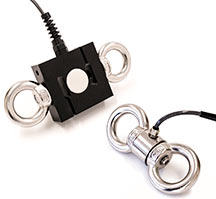
High precision In-Line range of Load Cells are used for tensile applications and may be used in any attitude. S-Beam range of Load Cells are designed for compression applications and may be used in-line or end mounted.
The various load/strength data collected may be synchronized real-time with other DataLITE sensors as part of a complete DataLITE system. Interfacing is effortless as all the precision calibration data is pre-programmed within the microprocessor controlled units.
DataLITE ADVANCE
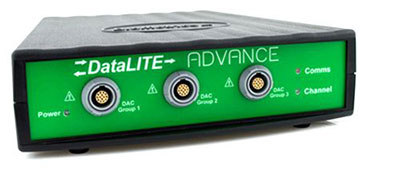
DataLITE ADVANCE is the latest addition to the DataLITE wireless sensor range of research and engineering products. It is a desktop unit incorporating all the same features of DataLITE with the addition of analogue outputs for each channel of wireless data. This standard analogue output is easy to interface to and provides the user with a very simple, accurate and robust way of sending data to 3rd party systems.
- 24 analogue and 12 digital sensor outputs
- Transfer DataLITE sensor data to 3rd party instrumentation such as video motion captures e.g. Vicon, Qualisys, and Peak Performance
- Known exact latency of 100 mS delay to a 3rd party instrument
- Additionally, once configured, DataLITE ADVANCE may be disconnected from the PC, allowing it to be used solely as an analogue output unit. This provides a very robust, novel product which may be used independent of the PC.
DataLITE Hand Held Trigger Switch (IS6LED)
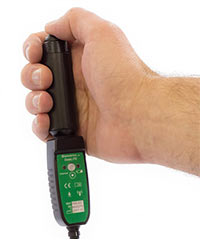
The DataLITE Hand Held Trigger Switch (IS6LED) provides the user with a very accurate solution of synchronizing the DataLITE with DataLOG or other 3rd party systems, such as a Vicon or Qualisys motion analysis camera based system.
In all cases the Trigger Switch enables the timing of the systems to be synchronized to ≤3mS typically over a 1-hour recording. In addition, it may be used as an event marker input to any DataLITE system recording.
The timing method for synchronization may be:
- Visual - using a large green LED mounted on the front of the Trigger Switch
- Electrical - using an attachment cable and digital signal
Trigger Switch Components

- A large green LED for accurate synchronization with other visual recording systems.
- A top mounted large button to start and stop a recording. This button can be programmed to be used as a trigger switch during recording instead of stopping the recording.
- A socket mounted at the bottom of the unit which is used for wired electrical synchronization with a 3rd party system.
Prepackaged DataLITE Wireless Systems
A selection of prepackaged systems is available. Each includes the wireless dongle and charging adapter plus a variety of sensors and analysis software. Click here to download a PDF file with the details.


